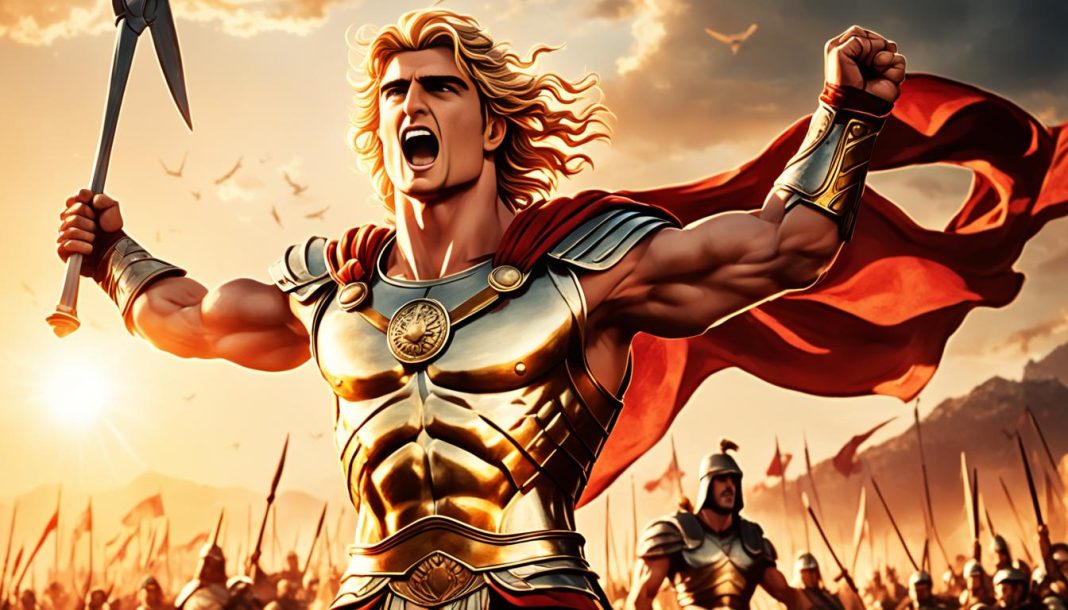Understanding Alexander: Insights and Analysis Story

Imagine a time in the ancient world when one man’s ambition and leadership skills shaped the course of history. This man was Alexander, a historical figure renowned as a conqueror and military leader. Born in Macedonia, Alexander rose to prominence through his unmatched military prowess, leaving behind a legacy that continues to be studied and celebrated today.
Alexander’s biography is filled with tales of epic conquests and the establishment of a vast empire that stretched across the ancient world. From his early education under the renowned philosopher Aristotle to his strategic military campaigns that led to the downfall of the Persian Empire, Alexander’s life is a testament to his remarkable leadership and military genius.
The impact of Alexander’s conquests can still be felt in the cultural and historical remnants of the regions he conquered, as well as in the military strategies he employed. His blending of cultures and the spread of Greek language and ideas during the Hellenistic era are evidence of his enduring influence.
Join us as we delve into the details of Alexander’s life, exploring his conquests, his impact on the ancient world, and his lasting legacy as a military strategist and leader. Discover the personal life and character of this remarkable figure, as well as the archaeological excavations that continue to unveil new insights into his empire. Let us uncover the influence of Alexander on military strategy and leadership, and explore the cultural depictions of this legendary conqueror in popular culture.
Unlock the captivating story of Alexander the Great and gain a deeper understanding of his historical significance and lasting legacy.
Key Takeaways:
- Alexander was a legendary conqueror and military leader from Macedonia in the ancient world.
- His conquests and establishment of a vast empire had a profound cultural and historical impact on the regions he conquered.
- Alexander’s military strategies and leadership qualities continue to inspire and influence military leaders today.
- His life and achievements are the subject of numerous cultural depictions in movies, books, and art.
- Archaeological excavations play a crucial role in uncovering the remnants of Alexander’s empire and expanding our understanding of his legacy.
Early Life and Education of Alexander
Alexander, born in 356 BCE in Pella, the capital city of Macedonia, was the son of King Philip II and Queen Olympias. His early life in Macedonia laid the foundation for his remarkable journey as a conqueror and military leader.
From a young age, Alexander received an exceptional education, shaping his intellectual and philosophical perspectives. His education was overseen by none other than the renowned philosopher Aristotle, who tutored him in various subjects.
This early education had a profound impact on Alexander’s upbringing, instilling in him a thirst for knowledge, critical thinking, and a deep appreciation for the arts and sciences. It also played a crucial role in nurturing his military and leadership abilities.
Guided by Aristotle’s teachings, Alexander developed a well-rounded understanding of politics, philosophy, and the principles of warfare. This combination of intellectual and military education would prove instrumental in his future endeavors.
Alexander’s early life and education set the stage for the incredible journey that awaited him. His ambitions and thirst for conquest would be shaped not only by his upbringing in Macedonia but also by the knowledge and wisdom imparted by his mentor, Aristotle.
Alexander’s Conquests and Empire
One of Alexander’s most remarkable achievements was his series of military conquests, which resulted in the establishment of one of the largest empires in history. Through a series of strategic military campaigns, Alexander swiftly conquered the Persian Empire, including Egypt and the Indus Valley. His empire stretched from Greece to Egypt, and as far east as India, firmly establishing him as a legendary conqueror.
During his military campaigns, Alexander displayed exceptional leadership and tactical prowess. He employed a combination of innovative strategies and the strength of his army to overcome formidable opponents and expand his empire. His conquest of the Persian Empire, which had reigned over a vast territory for centuries, marked a turning point in the ancient world.
In Egypt, Alexander was hailed as a liberator, overthrowing the Persian rulers and becoming the pharaoh. He founded the city of Alexandria, which became a center of Hellenistic culture and learning. In India, his military campaigns took him to the banks of the River Hydaspes, where he faced formidable opponents such as King Porus. Despite facing resistance, Alexander’s military tactics and determination ultimately led to his victory.
“I would rather live a short life of glory than a long one of obscurity.”
By the time of his death at the age of 32, Alexander’s empire had become an unprecedented amalgamation of diverse cultures and civilizations. The cultural fusion he initiated, known as the Hellenistic period, resulted in the blending of Greek, Persian, Egyptian, and Indian influences. His empire became a center of trade, knowledge, and cultural exchange.
As a conqueror, Alexander’s military campaigns left an indelible mark on history. His conquests and empire-building strategies inspired future leaders and military tacticians for centuries to come. The audacity and ambition he displayed in achieving his goals continue to captivate and inspire individuals in both military and non-military realms.
Leadership and Military Strategy of Alexander
Alexander was known for his exceptional military leadership skills and military strategy. He displayed a strategic genius that set him apart from his contemporaries. Alexander’s ability to analyze the battlefield and make quick decisions was awe-inspiring, solidifying his reputation as a masterful leader.
One of the hallmarks of Alexander’s military prowess was his use of innovative tactics. He was not afraid to deviate from conventional methods and experiment with new approaches to achieve victory. His willingness to adapt and think outside the box gave him a significant advantage on the battlefield.
Alexander’s Macedonian phalanx was a key component of his military success. This tightly-packed formation of soldiers carrying long spears was incredibly effective in creating a formidable defensive wall and penetrating enemy lines. The Macedonian phalanx allowed Alexander to overwhelm his opponents with its disciplined and coordinated movements.
In summary, Alexander’s military leadership and strategic genius propelled him to unparalleled victories. His ability to leverage innovative tactics and harness the power of the Macedonian phalanx showcased his extraordinary military acumen. These qualities cement his status as one of history’s greatest military leaders.
Cultural and Historical Impact of Alexander
Alexander’s conquests during the Hellenistic era had a profound cultural and historical impact on the regions he conquered. As his empire expanded, so did the blending of different cultures, leading to a remarkable diffusion of Greek language, culture, and ideas. This cultural exchange left an indelible mark on the societies and civilizations that emerged in these conquered territories.
The spread of Greek language and culture facilitated by Alexander’s empire created a unique cultural fusion. Greek became the lingua franca of the Hellenistic world, allowing for communication, trade, and the exchange of knowledge and ideas across vast distances.
The Hellenistic era witnessed an unprecedented blending of diverse traditions and practices with Greek culture. The conquered territories adopted Greek art, architecture, literature, philosophy, and religion, resulting in new and distinct cultural expressions. This amalgamation of cultures gave rise to innovative artistic styles, such as the Greco-Buddhist art that flourished in the Hellenistic kingdoms of present-day Afghanistan and Pakistan.
This blending of cultures facilitated by Alexander’s empire also led to the spread of Greek influence beyond the realms of art and language. Greek administrative systems, coinage, and urban planning became prevalent in the conquered territories, shaping their political and civic structures. The Hellenistic cities founded by Alexander and his successors became vibrant centers of intellectual, cultural, and commercial activities, fostering advancements in various fields.
Alexander’s cultural diffusion played a pivotal role in the transmission of knowledge and ideas between the East and the West. It laid the foundation for the later flourishing of Greco-Roman civilization and its profound influence on subsequent societies and civilizations.
“Through his empire, Alexander brought together the diverse cultures of the Mediterranean and the Near East, creating a harmonious blend that shaped the course of history.”
Legacy and Historical Significance of Alexander
Alexander’s historical significance and military legacy have left an indelible mark on the world. His remarkable feats as a conqueror and military leader have solidified his place in history as a revered figure. His impact is evident in the ways he continues to inspire future leaders and shape the course of history.
Many prominent leaders throughout history drew inspiration from Alexander’s strategies and tactics. Figures like Julius Caesar and Napoleon Bonaparte admired and emulated his military prowess, recognizing his genius on the battlefield. Alexander’s ability to conquer vast territories and lead his troops to victory served as an inspiration for generations to come.
“I would rather live a short and glorious life than a long and monotonous one.” – Alexander the Great
Alexander’s influence on the ancient world cannot be overstated. His conquests and establishment of a vast empire set the stage for the Hellenistic era and shaped the cultural landscape of the conquered regions. The spread of Greek language, culture, and ideas in these regions stands as a testament to his enduring impact.
Furthermore, Alexander’s military strategies and leadership qualities continue to be studied and revered today. His emphasis on innovation, mobility, and adaptability set a precedent for future military leaders, shaping the course of military strategy for centuries.
Alexander’s historical significance and military legacy make him an iconic figure in history. His accomplishments continue to awe and inspire, leaving an indelible mark on the world and ensuring his enduring legacy.
Personal Life and Character of Alexander
While Alexander is primarily known for his military exploits, his personal life and character are also of great interest. He had complex relationships, including a tumultuous marriage to Roxana and close bonds with his generals. Alexander’s ambition and determination to conquer the world were key aspects of his personality, shaping his leadership style and driving his relentless pursuit of success.

“My boy, you must find a kingdom big enough for your ambition.” – King Philip II of Macedonia
Alexander’s personal life and relationships played a significant role in his pursuit of greatness. His marriage to Roxana was marked by both love and turmoil. Though their union was strained by the challenges of his military campaigns and his infidelity, Alexander deeply cared for Roxana and their young son.
In addition to his marriage, Alexander formed strong bonds with his generals, such as Hephaestion and Ptolemy. These relationships were characterized by loyalty, trust, and a shared vision for conquest. Alexander relied on their support and counsel, fostering an environment of camaraderie among his inner circle.
Ambition coursed through Alexander’s veins. From a young age, he yearned for greatness, driven by a desire to surpass the achievements of his father, King Philip II. This burning ambition fueled his relentless pursuit of conquest, propelling him to conquer vast territories and establish one of the largest empires in history.
Alexander’s leadership style was shaped by his ambitious nature. He led from the frontlines, often risking his own life in battle, inspiring his troops by example. His unwavering determination and ability to make quick decisions on the battlefield earned him the loyalty and admiration of his soldiers.
Ultimately, Alexander’s personal life and character were intertwined with his military achievements. His complexity as a leader, husband, and friend influenced his actions, driving him to leave an indelible mark on history.
Alexander’s Death and Succession
Alexander’s life came to an untimely end in 323 BCE, when he passed away at the young age of 32. His death not only marked the loss of a great conqueror but also set in motion a power struggle among his generals, known as the Diadochi.
With Alexander gone, his empire faced the challenge of succession. The Diadochi, eager to hold power and continue the legacy, vied for control over the vast territories he had conquered. The empire that Alexander had built, spanning across Greece, Egypt, and as far east as India, was divided among his successors.
This division led to the fragmentation of the empire and the beginning of the Hellenistic period, characterized by the dominance of Greek culture and influence in the newly formed kingdoms that emerged.
“The death of Alexander the Great was not only significant in ending his rule, but it also marked the start of a new era defined by the struggles and divisions among his followers.” – Historian quote
The aftermath of Alexander’s death and the subsequent division of his empire had profound historical repercussions. It shaped the political landscapes of the conquered territories, sparking conflicts and rivalries that lasted for generations. The legacy of Alexander’s empire endured through the influence and impact of the Hellenistic kingdoms that emerged in its wake.
The Diadochi: Power Struggles and Ambitions
The competition among the Diadochi for control over the empire was fierce. Each general sought to establish their own dominion, leading to conflicts and betrayals. This struggle for power played out for years, with alliances shifting and territories changing hands.
While some Diadochi sought stability and continuity, others aimed for personal greatness and expansion. The disputes and power struggles among these successors of Alexander ultimately shaped the political landscape of the ancient world.
The Hellenistic Era: A New Age
The division of Alexander’s empire marked the beginning of the Hellenistic era, characterized by the fusion of Greek and local cultures. The Hellenistic kingdoms that emerged in the wake of Alexander’s death not only preserved Greek traditions but also absorbed and assimilated local customs and traditions.
This cultural blend led to advancements in various fields, including art, science, and philosophy. The Hellenistic era left a lasting influence on the regions that were once part of Alexander’s empire and played a crucial role in shaping the historical trajectory of the ancient world.
Cultural Depictions and Alexander in Popular Culture
Alexander’s captivating life and achievements have made him a prominent figure in popular culture, inspiring numerous cultural depictions in movies, books, and art. Through various media, his story continues to inspire and fascinate people around the world.
Epic films have brought Alexander’s grandeur and conquests to life, showcasing his military prowess and strategic genius. These movies capture the epic scale of his campaigns and the impact he had on the ancient world. From historical dramas to action-packed adventures, Alexander’s legend thrives on the silver screen.
Books have also played a significant role in depicting Alexander’s life and legacy. Authors have explored his character, his conquests, and the far-reaching ramifications of his empire. Historical novels and biographies offer readers a deeper understanding of the man behind the legend, delving into his motivations, relationships, and the complexities of his leadership.
Artistic interpretations of Alexander can be found in various forms, including paintings, sculptures, and portraits. Artists have sought to capture his persona, his achievements, and the influence he left on the ancient world. These artistic representations allow us to visually connect with the historical figure, providing a glimpse into his larger-than-life presence.
The Power of Cultural Depictions
Alexander’s enduring presence in popular culture is a testament to his lasting impact. Cultural depictions not only entertain but also educate audiences, bringing history to life and sparking curiosity about the ancient world. Through movies, books, and art, Alexander’s legacy continues to resonate with people of all ages and backgrounds.
Discovering Alexander’s Legacy: Archaeological Excavations
Archaeological excavations have played a crucial role in uncovering the remnants of Alexander’s empire and shedding light on his legacy. These excavations provide valuable insights into the lives and cultures of the people who lived during Alexander’s time.
Discoveries from these excavations include ancient cities, artifacts, and inscriptions that offer a glimpse into the past. These findings not only help us understand the scope of Alexander’s empire but also provide clues about the daily lives and customs of the people who were part of his world.
One notable discovery is the city of Alexandria, founded by Alexander himself. Located on the Mediterranean coast of Egypt, this city became a prominent center of culture and learning during the Hellenistic period. Excavations in Alexandria have revealed magnificent structures like the famous Pharos lighthouse and the Library of Alexandria, highlighting the grandeur and sophistication of the city.
Other excavations have unearthed a wide range of artifacts, including coins, pottery, weapons, and jewelry. These artifacts offer a tangible connection to Alexander and his empire, allowing us to examine their craftsmanship, styles, and symbolism. Each artifact contributes to our understanding of the past and adds to the mosaic of Alexander’s legacy.
“Archaeology enables us to piece together the puzzle of Alexander’s empire, filling in the gaps left by historical accounts. It helps us go beyond the records to explore the material remains of his world, confirming and sometimes challenging our assumptions about his reign.”
Furthermore, inscriptions found in archaeological sites provide important details about the administration, laws, and customs of Alexander’s empire. They offer a glimpse into the multicultural and multilingual nature of his dominions, reflecting the cultural blending that occurred as a result of his conquests.
As excavations continue, our understanding of Alexander’s empire and its impact continues to expand. The artifacts, cities, and inscriptions discovered provide valuable evidence that allows us to delve deeper into the history and legacy of this influential figure. Through archaeology, we can uncover the stories of those who lived during Alexander’s time and gain a greater appreciation for the lasting impact he had on the ancient world.
Alexander’s Influence on Military Strategy and Leadership
Alexander the Great’s military strategy and leadership style have had a profound and lasting impact on the study of warfare. His innovative tactics and ability to lead his troops to victory continue to be studied and admired by military strategists and historians to this day. Alexander’s emphasis on innovation, mobility, and adaptability set a precedent for future military leaders, shaping the way wars are fought and won.
One of Alexander’s most significant contributions to military strategy was his ability to adapt to various battle conditions and terrain. He understood the importance of flexibility and adjusted his tactics accordingly, making him a formidable opponent on the battlefield. His ability to analyze the strengths and weaknesses of both his own forces and the enemy’s allowed him to develop highly effective strategies tailored to each situation.
Alexander was also a master of strategic planning. He meticulously prepared his armies before each campaign, taking into account factors such as terrain, weather, and the capabilities of his troops. This attention to detail and careful planning helped ensure the success of his military campaigns.
Furthermore, Alexander’s leadership style played a crucial role in his achievements. He led by example, inspiring his troops with his bravery and his unwavering determination. His charismatic personality and ability to instill confidence in his soldiers allowed him to forge a deep bond with them, fostering loyalty and unity within his ranks.
“I am indebted to my father for living, but to my teacher [Aristotle] for living well.”
– Alexander the Great
Alexander’s impact on military strategy and leadership extends far beyond his own time. His innovative tactics, such as the famous Macedonian phalanx, influenced future military leaders and served as the foundation for many military doctrines. The lessons learned from Alexander’s triumphs and failures continue to shape military thinking and inspire leaders in their strategic decision-making.
By studying Alexander’s military campaigns and analyzing his tactics, modern strategists gain valuable insights into the art of warfare. His ability to think strategically, adapt to changing circumstances, and inspire his troops remain invaluable lessons in leadership and military strategy. Alexander’s legacy as a military genius and visionary leader endures, leaving an indelible mark on the study of warfare.
Conclusion
In conclusion, Alexander the Great’s life and achievements as a conqueror, military leader, and cultural influencer have left an enduring legacy. His impact on the ancient world and his innovative military strategies continue to captivate and inspire people to this day. Alexander’s story serves as a testament to the power of leadership, ambition, and the relentless pursuit of knowledge and excellence.
Alexander’s conquests and the establishment of his vast empire, spanning from Greece to Egypt and India, solidified his position as one of the greatest military leaders in history. His ability to analyze the battlefield, make quick decisions, and utilize his Macedonian army’s strengths, particularly the Macedonian phalanx, showcased his strategic genius.
Not only did Alexander’s conquests shape the political landscape of the ancient world, but they also had a profound cultural and historical impact. Through the blending of different cultures, Alexander facilitated the spread of Greek language, culture, and ideas, giving rise to the Hellenistic era. His influence on future leaders, such as Julius Caesar and Napoleon Bonaparte, further highlights the far-reaching effects of his achievements.
Thanks For Reading…Understanding Alexander: Insights and Analysis
How much did you like Understanding Alexander: Insights and Analysis? Please share your views in the comment box. Also, please share this story with your friends on social media so they can enjoy it, and for more such stories, please bookmark storiespub.com.
Check out other stories that we have:
























